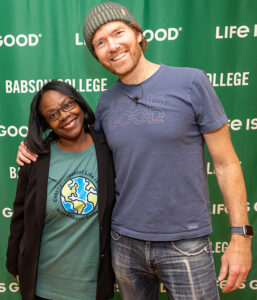[ad_1]
John Jacobs’ enthusiasm is as infectious as his message of optimism.
The co-founder and chief creative optimist of Life is Good captivated and inspired students, faculty, and staff at “the best school in the world for entrepreneurship” Monday at Knight Auditorium as he delivered the keynote address of Babson College’s Global Entrepreneurship Week.
After being introduced by Donna Levin, CEO of the Arthur M. Blank School for Entrepreneurial Leadership, Jacobs recounted the journey of the iconic lifestyle brand that he and his brother Bert started three decades ago in an uplifting presentation filled with laughter and tears—and the occasional Frisbee toss.
Jacobs spoke about the lessons of their mother, Joan, who asked her six children daily to “tell me something good that happened today.” He spoke about how he and Bert built and grew their company, even beginning meetings with that prompt. And, he spoke about how Life is Good’s message of optimism has buoyed them during difficult times and has even inspired children facing daunting challenges.
“Every morning, every one of us wakes up with a choice to focus on obstacles or opportunities,” Jacobs concluded. “Life isn’t easy, life isn’t perfect, but if … we choose to focus not on obstacles but instead on a wide world of opportunity, then life is good.”
After his address, Jacobs interacted with students for more than an hour, then he sat down with Babson Thought & Action to share more insights on the power of optimism:
How has the Life is Good message of optimism been embraced especially by aspiring entrepreneurs?
“It’s helpful to hear about the failures, and there were lots of them. One of the questions that I was asked is, ‘How did you get through the harder times?’ It certainly helps to have a partner, a friend, or just a smart buddy you can use as a sounding board. From my perspective, I don’t think my brother or I would have made it five years with all those rejections if we couldn’t laugh things off with each other and create an adventure out of it. Also, the idea that actually putting product in front of people, even if the feedback is harsh, ultimately is a win for you. I always like to say when you try, you either succeed or you learn, so both of them are positive. Rejection becomes your ultimate teacher and trainer. Sometimes that’s easier to see in retrospect, but the only way we were going to propel the company forward is if we take notes and try to understand why people don’t want our shirts. So, we took a lot of detailed notes about what people said. That is a core value of Babson, which is listening and then responding. We’d go back to the drawing board constantly. So, I think all those things hopefully resonate with kids who are working on their own business ideas.”

Babson develops entrepreneurial leaders who can harness the power of people to identify and solve problems big and small. How do positivity and optimism relate to entrepreneurial leadership?
“If you go back in history, there are not a lot of pessimists that people rallied around and followed. So, I think it’s a core component of good leadership, whether it’s in sports or business or any realm of life. … We want to believe in something exciting on the horizon, and it takes optimism in order to paint that picture. I love the saying, ‘I have to believe it to see it.’ And it’s so true. You’ve got to be able to picture the win before it actually happens.”
“We want to believe in something exciting on the horizon, and it takes optimism in order to paint that picture.”
John Jacobs, chief creative optimist, Life is Good
You noted that optimism is most powerful in darkest times. As the company has navigated its ups and downs, how hard is it to maintain that positivity?
“It’s not easy at all. We owe it to our mom, who showed us a model of what it can do. She did not have an easy environment in which she was raising six kids, and she found a way to access music, humor, storytelling, art, and brought joy to her kids and kids in the neighborhood. That really is the foundation of the company. So, when you face something as daunting as the recession or the pandemic, our minds immediately go to that approach of focusing more energy on the opportunities than on the obstacles. And, it’s a formula we really believe in, and we’ve seen it work our whole lives, both in personal life and through the journey of our business.”
The Blank School also focuses on values-based leadership. As the co-founder of a business built on values, how important is it for companies and organizations today to state and uphold their values, especially when the going gets tough?

“It’s one of those things that enables you to persist when you hit pretty big roadblocks or obstacles, because the pursuit of money or the pursuit of fame or something is kind of limited. I noticed it when we got better at communicating about our nonprofit work (the Playmaker Project) that our team seemed more galvanized. That was about the deeper purpose, because whether we were selling shirts well or not well, the ability to change kids’ lives, through the nonprofit work, fires up everybody on our team. I’m tying in values with a social cause, but when your values are optimism, gratitude, compassion, then the social cause weaves in very naturally with that. … One comment that I heard from students at the end here today was several of them brought up that ‘business for good is good for business.’ As many of these young entrepreneurs can infuse a social cause early, I think they’ll find that it’s easier to get support, teammates, momentum, because you have something to rally around that resonates at a deeper level.”
Finally, tell me something good that happened today.
“I learned that the CEO of the Blank School loves Ben Harper, like I do. We had a lot of fun talking about music festivals. And, I got to meet just a ton of energized, really good young students.”
Posted in
Community, Entrepreneurial Leadership, Insights
[ad_2]
Source link

